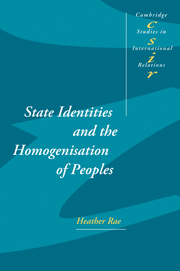Book contents
- Frontmatter
- Contents
- Preface
- Introduction
- 1 State formation and pathological homogenisation
- 2 The ‘other’ within Christian Europe: state-building in early modern Spain
- 3 State-building in early modern France: Louis XIV and the Huguenots
- 4 Pathological homogenisation and Turkish state-building: the Armenian genocide of 1915–1916
- 5 ‘Ethnic cleansing’ and the breakup of Yugoslavia
- 6 Evolving international norms
- 7 On the threshold: the Czech Republic and Macedonia
- Conclusion
- Bibliography
- Index
- CAMBRIDGE STUDIES IN INTERNATIONAL RELATIONS
1 - State formation and pathological homogenisation
Published online by Cambridge University Press: 22 September 2009
- Frontmatter
- Contents
- Preface
- Introduction
- 1 State formation and pathological homogenisation
- 2 The ‘other’ within Christian Europe: state-building in early modern Spain
- 3 State-building in early modern France: Louis XIV and the Huguenots
- 4 Pathological homogenisation and Turkish state-building: the Armenian genocide of 1915–1916
- 5 ‘Ethnic cleansing’ and the breakup of Yugoslavia
- 6 Evolving international norms
- 7 On the threshold: the Czech Republic and Macedonia
- Conclusion
- Bibliography
- Index
- CAMBRIDGE STUDIES IN INTERNATIONAL RELATIONS
Summary
Within the study of international relations surprisingly little attention has been paid to the relationship between strategies of pathological homogenisation and state formation. As a result key questions about the relationship between state formation, sovereignty, changing forms of political legitimacy and the building of collective identities – all areas that have recently received greater attention in international relations – have not been brought to bear on the treatment of those deemed ‘political misfits’. Indeed, the targeting of minority groups for expulsion, or other even harsher measures, has until recently been seen as representing crises within states, and therefore beyond the provenance of international relations theory. Or, once refugees spill over state borders in large enough numbers, or atrocities reach a level which ‘shock the conscience of humankind’ and become potentially destabilising, they are regarded as examples of systemic breakdown, as anomalies which must be attended to at a practical level, but which require little further explanation.
These processes, I contend in the following chapters, are an integral part of the state system, and practices of pathological homogenisation have, in part, constituted the states system, for it has been constructed in large measure on the exclusionary categories of insider and outsider. This is not to assert that the most extreme forms of mistreatment are in some way inevitable, only that they remain a possibility in a system which is based on a sharp distinction between insiders and outsiders.
- Type
- Chapter
- Information
- State Identities and the Homogenisation of Peoples , pp. 14 - 54Publisher: Cambridge University PressPrint publication year: 2002



